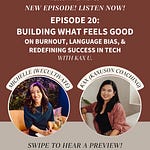After the Mic is a space for post-episode reflections from the podcast: what lingered, what shifted, and what got left unsaid. These are the thoughts that stay with me once the mic turns off. After I’m done speaking with my guests and releasing the full episode. They feature moments I’m still chewing on, questions that emerged in conversation, or things I wish I had said. This podcast is an audio-first production and you can listen to the full versions on Spotify and Apple. The video recording of the episode has been added above.
Full episode library and show notes here: https://www.wecultivate.world/podcast
🎙️After the Mic
Episode 6: From Ancient Egypt to Modern Classrooms: The Journey of Learning 65 Languages (and counting!) with Sean L. Young [Part 2]
This was the second part of my first guest podcast episode and listening back, I can hear all the ways I was learning in real time. Not just from Sean, but from the process itself. As I was talking, I was also asking myself questions like: How do I make this sound decent with budget gear? What do I edit out or keep in? What if my guest doesn’t like the questions I ask them?
As a new podcast host, there was a lot to hold.
But the biggest thing I’ve come to reflect on from this episode isn’t technical—it’s conceptual. And the conversation with my guest notwithstanding, there’s something I wish I had said more clearly, especially as someone who has lived in a few places across the world:
🇺🇸 The U.S. doesn’t have ONE single education system. Nor national education standards.
That fact might seem obvious, but it’s often left unsaid. Or, maybe you’re hearing this for the first time.
🏫 The U.S. has over 13,000 public school districts, governed and funded at the local (city/town) and state level. The school boards of these districts decide what is or isn’t taught.
(This is not counting non-public/private options, which are a whole other thing.)
That means education content and quality varies DRAMATICALLY based on where you LIVE.
Your zip code can shape everything from class size to teacher retention to whether you have art, science, foreign language(s), or even affordable lunch options.
See, many national systems “abroad,” though imperfect in their own ways, are centralized enough that people share a more unified educational experience. But in the U.S., growing up in California vs. Mississippi vs. New York can feel like growing up in three different COUNTRIES. Not only via social culture, but LEGALLY.
😵💫 Which is why talking to “Americans” from different parts of the U.S. often leads to completely different conversations. Different visions of the country.
But it doesn’t stop with education.
🩺 Healthcare? Medicaid and insurance access vary by state.
🏛️ Tax policy? Wildly different, for businesses and individuals.
💼 Wages and labor protections? Depends on local laws and how they interact with federal policy.
🚸 Driving age? Also varies by state.
That’s why when people say “U.S. education” or “the U.S. education system” I always pause.
Because even neighboring schools in the same district can have different standards, different class sizes, different resources.
A fact that few U.S. citizens realize is a uniquely “us” thing.
(Bonus points if you caught the wordplay.)
It’s not just a metaphor. It’s literally a different reality shaped by property taxes, school boards, state laws, and the history of a place.
👉 So when someone says, “I didn’t learn that in school,” or “We all learned this growing up,” I have to ask: Who’s “we”?
Because speaking about the U.S. as if there’s a shared educational baseline is, frankly, inaccurate.
U.S. Americans live in a patchwork of systems—deeply unequal, often contradictory.
And if you’re from the U.S., it’s high time we start describing our experiences with more precision. Both in and out of the country.
Because without that clarity, we risk collapsing real structural problems into vague, recycled complaints—stripped of the context they so deeply require, especially in our world today.
📚For more information on “why” the U.S. is set up this way, I recommend learning a bit about the concept of “federalism.”
U.S. states are NOT just random separations in the sand created for historical fun. Each state holds power over what, who, and how one exists inside of everyday society. Which is why talking about geographical location is so important for the average U.S. born person.
Listen to the full episode on Spotify and Apple.
Full episode library and show notes here.









Share this post